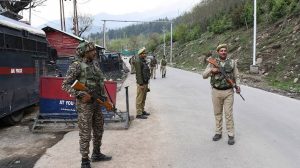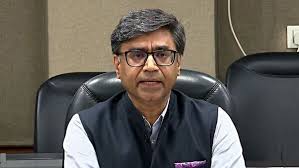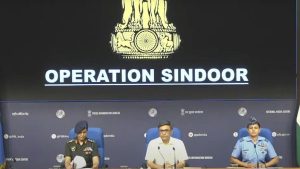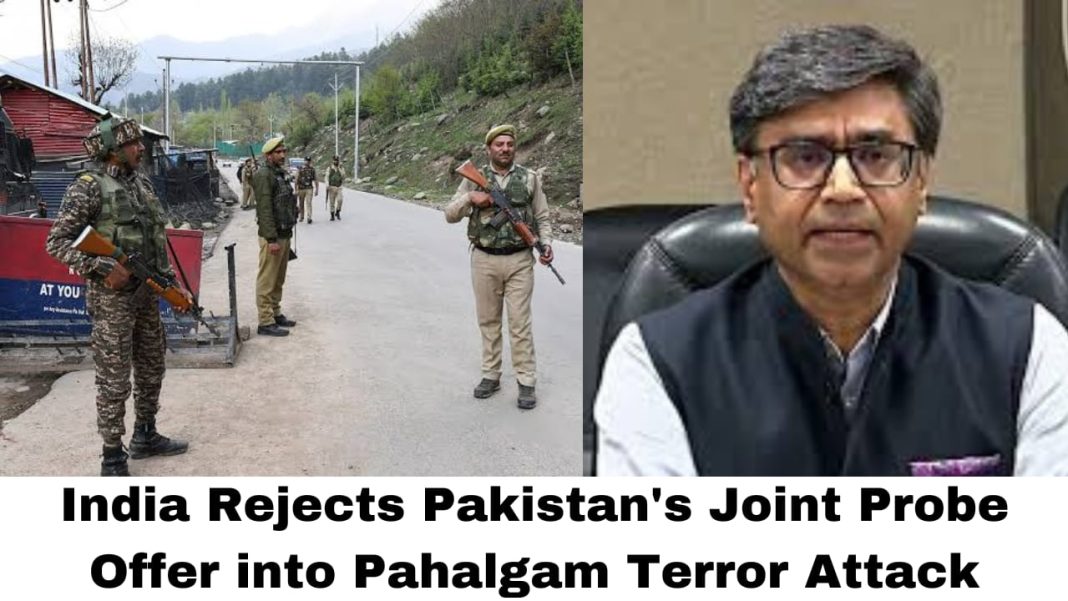Digital News Guru National Desk:
In the aftermath of the devastating terrorist attack in Pahalgam, Jammu and Kashmir, on April 22, 2025, which claimed the lives of 26 civilians, India has firmly rejected Pakistan’s proposal for a joint investigation. Referring to Pakistan’s offer of a joint probe into the recent Pahalgam attack, Mr Misri rejected the idea outright. “Asking Pakistan to co-investigate terror attacks on Indian soil is like asking the thief to investigate his own crimes.”
The Pahalgam Attack: A Brief Overview
The Pahalgam attack stands as one of the deadliest assaults on civilians in India since the 2008 Mumbai attacks.

Five heavily armed militants targeted tourists in the Baisaran Valley, resulting in 26 fatalities and numerous injuries. The Resistance Front (TRF), believed to be an offshoot of the Pakistan-based Lashkar-e-Taiba (LeT), claimed responsibility, citing opposition to non-local settlements in the region.
India’s Stance on the Joint Probe Proposal
Foreign Secretary Misri’s rejection of Pakistan’s joint investigation proposal is rooted in a history of perceived inaction and obfuscation by Pakistan in previous terror-related incidents. He emphasized that past instances, such as the 2008 Mumbai attacks and the 2016 Pathankot airbase attack, saw Pakistan allegedly using shared evidence to shield perpetrators rather than prosecute them.
“Pakistan’s reputation as the epicenter of global terrorism is rooted in numerous instances where concrete evidence is available,” Misri stated, referencing the discovery of Osama bin Laden in Pakistan and the nation’s leadership referring to him as a martyr.
Operation Sindoor: India’s Military Response
In retaliation to the Pahalgam attack, India launched “Operation Sindoor,” targeting terrorist infrastructure within Pakistan. The operation involved precise airstrikes on nine sites linked to terrorist groups, including Lashkar-e-Taiba and Jaish-e-Mohammed. India maintained that the strikes were measured and aimed solely at dismantling terror networks.
Pakistan, however, reported civilian casualties and condemned the strikes as violations of its sovereignty. The ensuing exchange of hostilities marked one of the most intense confrontations between the two nations in recent years.

Diplomatic Measures and International Reactions
Beyond military action, India undertook several diplomatic measures:
- Suspension of the Indus Waters Treaty: India halted the treaty, citing Pakistan’s continued support for cross-border terrorism.
- Closure of the Attari–Wagah Border Crossing: This move aimed to curtail direct interactions amidst escalating tensions.
- Expulsion of Pakistani Defense Advisors: India expelled Pakistani military personnel from its territory.
These actions signaled India’s firm stance against terrorism and its unwillingness to engage in joint probes with a nation it accuses of harboring and supporting terrorist entities.
Internationally, reactions were mixed. While countries like the United States and China called for restraint and dialogue, others, including Turkey and Azerbaijan, expressed support for Pakistan, leading to calls within India for boycotts of Turkish Airlines and other entities.
Intelligence Revelations and Arrests
Investigations into the Pahalgam attack revealed that the terrorists had communicated with their handlers based in Pakistan. This information, presented by Foreign Secretary Misri to a parliamentary panel, underscored the cross-border dimensions of the attack.
Further intensifying concerns, the Punjab Police arrested two individuals suspected of being Pakistani spies. Authorities allege that these operatives were activated by Pakistan’s intelligence agency, the Inter-Services Intelligence (ISI), following the Pahalgam attack, highlighting coordinated efforts to gather intelligence post-attack.

Conclusion
India’s rejection of Pakistan’s joint probe proposal into the Pahalgam terror attack underscores the deep-seated mistrust between the two nations. Citing a history of unaddressed grievances and perceived duplicity, India remains steadfast in its approach to counter-terrorism, emphasizing unilateral action and international cooperation over bilateral engagements with Pakistan.
As tensions persist, the international community watches closely, urging both nations to prioritize dialogue and de-escalation to ensure regional stability.
You May Also Read: SC Enforces ‘One Rank One Pension’ for All Retired High Court Judges








